

*Sharpening the Search Saw (Read or watch the Tucker webinar) *Tucker Webinar: Professional Searchers Today: Leadership Roles In Design & Information Experience (view or read the Tucker article) *Librarianship is a Technical Profession…That is All About People – R. David Lankes. [This is an edited version of the script I used for my talk.
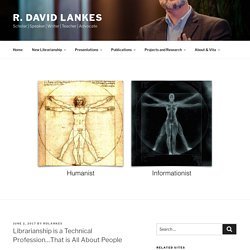
However, it is not a word for word transcript. Aside from added comments during the talk, I have edited and expanded the notes here to make them more readable. You can see a screencast of the actual presentation here.] A letter to my seniors (updated) A recent conversation on ALA’s INFOLIT list–By graduation, what should K-12 students know about web search?
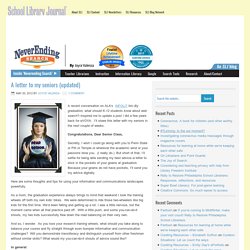
–inspired me to update a post I did a few years back for eVOYA. I’ll share this letter with my seniors in the next couple of weeks. Congratulations, Dear Senior Class, Secretly, I wish I could go along with you to Penn State or Pitt or Temple or wherever the academic wind or your passions blow you. (I really do.) Here are some thoughts and tips for using your information and communications landscapes powerfully. As a mom, the graduation experience always brings to mind that weekend I took the training wheels off both my own kids’ bikes. Glossary of Library & Information Science. AACR - See Anglo-American Cataloguing Rules (AACR, AACR2, AACR2R)AAP - See Authorized Access PointAccess - See Resource Access Access Point - Access Point refers to a name, term, code, heading, word, phrase etc., a unit of information representing a specific entity that can serve as a search key in information retrieval, under which a library catalog or bibliographic database may be searched and library materials may be identified and retrieved.
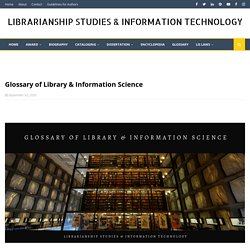
In a catalog, index, or other organized systems some examples of access points are, author, title, name (person, family, corporate body, etc.), subjects (topical, geographical, etc.), classification or call number, and codes such as ISBN, etc. which are chosen by the cataloger or indexer, when creating a bibliographic, authority, or metadata record (a surrogate), to enable the retrieval of the record. Assignment Indexing - See Assigned Indexing. Library Journal "Digital Libraries" Columns 1997-2007, Roy Tennant. Library Journal "Digital Libraries" Columns 1997-2007, Roy Tennant Please note: these columns are an archive of my Library Journal column from 1997-2007.
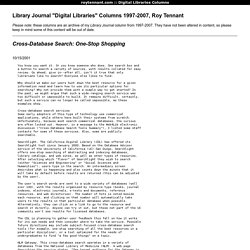
They have not been altered in content, so please keep in mind some of this content will be out of date. We Must Go Deeper (Dan Russell) In the movie Inception, the main character keeps goading his team further into the subconscious mind, saying “We must go deeper.”
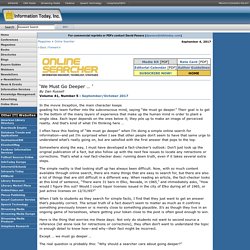
Their goal is to get to the bottom of the many layers of experience that make up the human mind in order to plant a single idea. Each layer depends on the ones below it; they pile up to make an image of perceived reality. And that’s kind of what I’m thinking here … I often have this feeling of “We must go deeper” when I’m doing a simple online search for information—and yet I’m surprised when I see that other people don’t seem to have that same urge to understand what’s really going on, but are satisfied with the first answer that pops to the top.
Framework for Information Literacy for Higher Education. Filed by the ACRL Board on February 2, 2015.
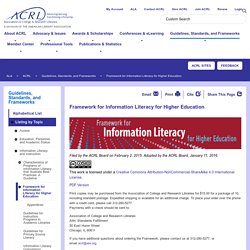
Adopted by the ACRL Board, January 11, 2016. This work is licensed under a Creative Commons Attribution-NonCommercial-ShareAlike 4.0 International License. PDF Version Print copies may be purchased from the Association of College and Research Libraries for $15.00 for a package of 10, including standard postage. Expedited shipping is available for an additional charge. Association of College and Research Libraries Attn: Standards Fulfillment 50 East Huron Street Chicago, IL 60611 If you have addtional questions about ordering the Framework, please contact us at 312-280-5277, or email acrl@ala.org.
ACRL has a history of supporting librarians in understanding and using the association’s standards and guidelines. Check for upcoming ACRL eLearning webcasts and online courses. Contents IntroductionFrames Appendix 1: Implementing the Framework Appendix 2: Background of the Framework Development Appendix 3: Sources for Further Reading Introduction Notes. SharedFoundations Inquire 2017. SharedFoundations Explore 2017. SharedFoundations Curate 2017. Threshold Concepts and Information Literacy. [Skip to Content] No institutional affiliation browse or menu Advanced Search Browse MyMUSE Account Log In / Sign Up Change My Account User Settings Access via Institution MyMUSE Library Search History View History MyMUSE Alerts Contact Support portal: Libraries and the Academy Abstract What do we teach when we teach information literacy in higher education?
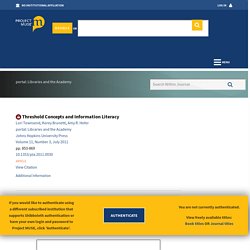
Project Information Literacy: The Algorithm Study. Big Tech’s Pandemic Power Grab - The Atlantic In the years before the virus, critics began to prophesy that a handful of tech companies would soon grow more powerful than the government.
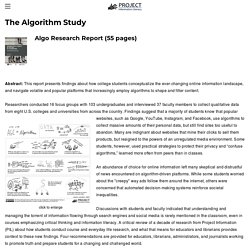
Their scale and influence, and their ability to manipulate public opinion and shape markets, would permit them to reign unimpeded. That warning, however dark, didn’t quite capture the emerging strategy of these firms—a strategy that was in fact taking shape before the pandemic began—or the graver threat they pose. Rather than supplanting government, they have, in essence, sought to merge with it. Facial recognition has always troubled people of color. Black and brown communities are often the first to warn about surveillance tech and the last to get recognized for it. Our reponse to the European Commission’s consultation on AI – AlgorithmWatch Engines of Order | Amsterdam University Press Microsoft Won’t Sell Face Recognition Software to Police - Bloomberg Microsoft Corp.
Information Cycle how information is created and disseminated, and how it evolves over time.